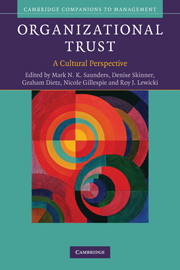Book contents
- Frontmatter
- Contents
- List of figures
- List of tables
- Note on editors
- Note on contributors
- Foreword
- Editors' acknowledgements
- Part I The conceptual challenge of researching trust across different ‘cultural spheres’
- 1 Unravelling the complexities of trust and culture
- 2 Trust differences across national–societal cultures: much to do, or much ado about nothing?
- 3 Towards a context-sensitive approach to researching trust in inter-organizational relationships
- 4 Making sense of trust across cultural contexts
- Part II Trust across different ‘cultural spheres’: inter-organizational studies
- Part III Trust across different ‘cultural spheres’: intra-organizational studies
- Part IV Conclusions and ways forward
- Index
- References
3 - Towards a context-sensitive approach to researching trust in inter-organizational relationships
Published online by Cambridge University Press: 05 June 2012
- Frontmatter
- Contents
- List of figures
- List of tables
- Note on editors
- Note on contributors
- Foreword
- Editors' acknowledgements
- Part I The conceptual challenge of researching trust across different ‘cultural spheres’
- 1 Unravelling the complexities of trust and culture
- 2 Trust differences across national–societal cultures: much to do, or much ado about nothing?
- 3 Towards a context-sensitive approach to researching trust in inter-organizational relationships
- 4 Making sense of trust across cultural contexts
- Part II Trust across different ‘cultural spheres’: inter-organizational studies
- Part III Trust across different ‘cultural spheres’: intra-organizational studies
- Part IV Conclusions and ways forward
- Index
- References
Summary
Summary
This chapter argues that trust is an inherently context-bound concept. With reference to the results of the Cambridge Vertical Contracts Project (CVCP) which examined supplier relations in the UK and Germany, it is shown that the nature and quality of inter-organizational trust varies greatly over different cultural and institutional environments. As a consequence, it is suggested that an appropriate research methodology needs to either draw on a mixed method approach involving different techniques to collect and analyse data (as has been done in the CVCP), or – perhaps even more suitably – utilize repertory grids to research a social phenomenon as complex as trust in a comparative perspective. The potential of the repertory-grid method is illustrated with reference to an empirical project on collaborative relationships in two virtual organizations in Switzerland.
Introduction
Over the past two decades or so, trust has attracted much attention in the management literature. Many scholars have tried to come to grips with this phenomenon and discovered many aspects of it which seem worth thorough investigation. The relationships between trust and contracts, trust and innovation and trust and institutions are among the most developed sub-themes of trust research. Key publications have recently tried to summarize where we stand and to take stock of the major results in this research field (e.g. Bachmann and Zaheer, 2006; Bachmann and Zaheer, 2008; Kramer, 2006). As these publications show, significant progress has been made and some very important insights have been gained into how trust works in business relationships.
Information
- Type
- Chapter
- Information
- Organizational TrustA Cultural Perspective, pp. 87 - 106Publisher: Cambridge University PressPrint publication year: 2010
References
Accessibility standard: Unknown
Why this information is here
This section outlines the accessibility features of this content - including support for screen readers, full keyboard navigation and high-contrast display options. This may not be relevant for you.Accessibility Information
- 17
- Cited by
